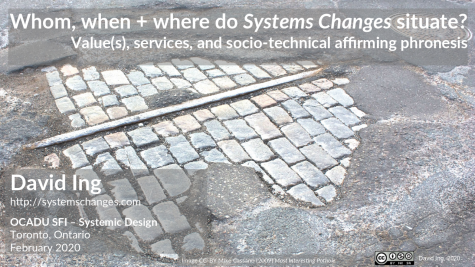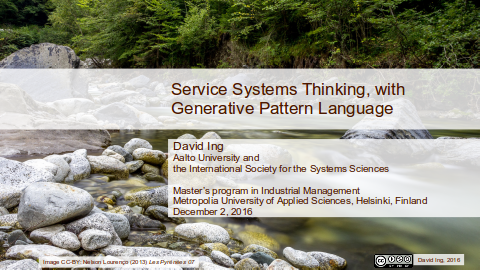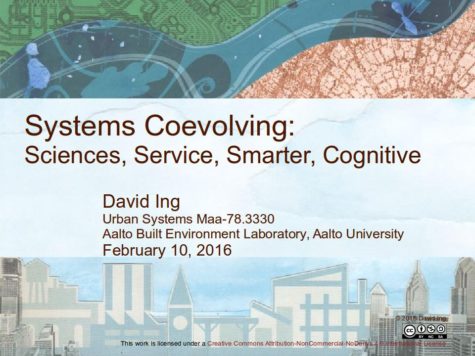Covering practical wisdom (phronesis), the third of four lectures again was compressed for the Systemic Design course in the Master’s program in Strategic Foresight and Innovation at OCAD University. The students in the part-time session on February 7 extended their discussion period longer than those in the full-time session on February 5. I again jumped slides in the sequence to stay within the timebox.
The agenda was in four sections:
- [preamble] Episteme, Techne, Phronesis (reordered)
- Intellectual Pursuits (Rethinking Systems Thinking)
- Systems changes as situated c.f. ideal-seeking
- A. Value(s), Judgment, Soft Systems Thinking
- Appreciative Systems (Vickers, Checkland)
- Policy, impacts and consequences of systems changes
- B. Service Systems (c.f. Production Systems)
- Science of Service Systems (Spohrer, Kijima)
- Material-products c.f. information-services as systems changes
- C. Socio-Technical Systems Perspective
- Tavistock Institute + Legacy (Trist, Emery, Ramirez)
- Coproduction and design principles guiding systems changes
The web video can be streamed on Youtube.
Copies of the video files are downloadable for disconnected viewing.
| Video | H.264 MP4 | WebM |
| February 7 (1h21m) |
[20200207_OCADU_Ing HD m4v] (HD 2477kbps 1.6GB) [20200207_OCADU_Ing nHD m4v] (nHD 1344kps 866MB) |
[20200207_OCADU_Ing HD webm] (HD VP8 375kbps 349MB) [20200207_OCADU_Ing nHD webm] (nHD VP8 139kbps 206MB) |
Readers who want to follow through on web link references may want to review the slides directly.
The same presentation slides were used for both lectures. The questions from the students were considerably different across the class sections, so the diligent listener might want to compare them. … Read more (in a new tab)
Covering practical wisdom (phronesis), the third of four lectures again was compressed for the Systemic Design course in the Master’s program in Strategic Foresight and Innovation at OCAD University. The students in the part-time session on February 7 extended their discussion period longer than those in the full-time session on February 5. I again jumped slides in the sequence to stay within the timebox.
The agenda was in four sections:
- [preamble] Episteme, Techne, Phronesis (reordered)
- Intellectual Pursuits (Rethinking Systems Thinking)
- Systems changes as situated c.f. ideal-seeking
- A. Value(s), Judgment, Soft Systems Thinking
- Appreciative Systems (Vickers, Checkland)
- Policy, impacts and consequences of systems changes
- B. Service Systems (c.f. Production Systems)
- Science of Service Systems (Spohrer, Kijima)
- Material-products c.f. information-services as systems changes
- C. Socio-Technical Systems Perspective
- Tavistock Institute + Legacy (Trist, Emery, Ramirez)
- Coproduction and design principles guiding systems changes
The web video can be streamed on Youtube.
Copies of the video files are downloadable for disconnected viewing.
| Video | H.264 MP4 | WebM |
| February 7 (1h21m) |
[20200207_OCADU_Ing HD m4v] (HD 2477kbps 1.6GB) [20200207_OCADU_Ing nHD m4v] (nHD 1344kps 866MB) |
[20200207_OCADU_Ing HD webm] (HD VP8 375kbps 349MB) [20200207_OCADU_Ing nHD webm] (nHD VP8 139kbps 206MB) |
Readers who want to follow through on web link references may want to review the slides directly.
The same presentation slides were used for both lectures. The questions from the students were considerably different across the class sections, so the diligent listener might want to compare them. … Read more (in a new tab)





